THE
PROTESTING PRIEST
Frank Cordaro has spent his
life working against the establishment. He’s got a few stories to tell
Words by Angela Ufheil
Photos by Hannah Little
Photos by Hannah Little
Frank Cordaro wants to
make one thing clear. He chose this life.
We’re standing in the
foyer of the Bishop Dingman House, one of four structures that make up the Des
Moines Catholic Worker. A cart filled with plastic-wrapped packages of bread
and bagels takes up space in the already-cramped room, as does a shelf lined with
boxes of cereal. In the kitchen, a team of volunteers is preparing spaghetti
and meatballs. A few dozen members of Des Moines’ homeless population watch the
news, play chess, and chat while waiting for dinner. They’ll take some of those
bagels with them on the way out.
The Catholic Worker
Movement is made up of 240 communities around the world, all united by a
mission to serve the homeless and protest injustice. Frank co-founded the
Des Moines, Iowa chapter in 1976, and he lives and serves the community now. In
the years between, he was a Catholic priest, a non-violent protester, and a
prisoner of the state.
Frank is 66 years old,
with a snowy-white beard and gut that’s probably caused a few kids to wonder
what Santa is doing in Des Moines. He wears black glasses that shift around his
face to accommodate dramatic facial expressions. He gets right in my face and
gestures broadly when he’s making a point. I’ve never once seen him sit still.
He can relate most
anything to the New Testament. He’s chosen poverty to better understand the
people he’s trying to serve. And his controversial protesting methods get
people talking. He’s inspired a lot of the people he works with: “For me, one
of the most significant things about Frank as a person is that he, for many
decades now, has been very committed to struggling for peace and justice,” said
Aaron Jorgenson-Briggs, a resident at the Catholic Worker. “And he has taken on
personal risk and made personal sacrifices to do that.”
He’s also pissed a lot of
people off. “Logic sometimes goes out the window with Frank,” said Bishop
Richard Pates, the current leader of the Des Moines Diocese. “I think he lives
in his own world sometimes.”
Frank won’t confine
himself to one identity. I find myself returning over and over again to Frank’s
favorite description of the Catholic Worker community. “We do heroic and noble
work here,” he said. “We’re not always heroic and noble people. And that’s OK.”
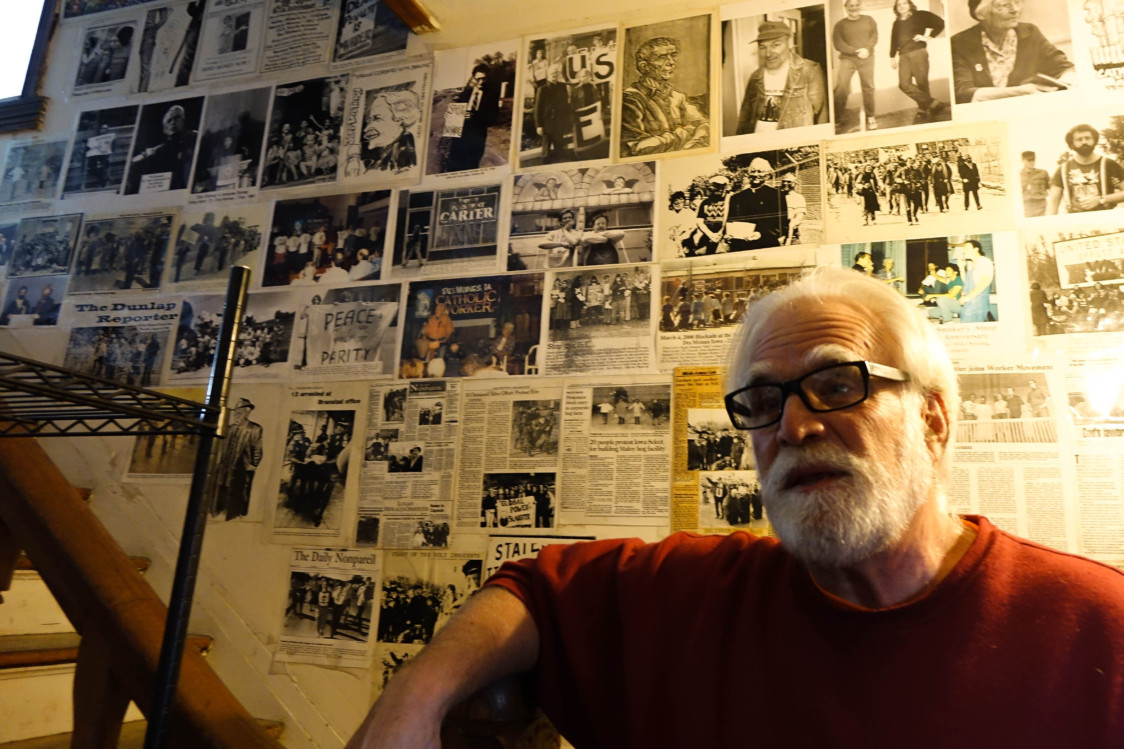
Frank Cordaro standing near the entrance to the Bishop
Dingman House, one of the Catholic Worker Houses in Des Moines. The wall behind
him is decorated with news-clippings of famous protesters.
The True Believer
Frank
doesn’t do anything halfway. “I’ve believed in a lot of things, but
at any given time, I believed in them strongly,” Frank said.
During his childhood in
Des Moines, those strong beliefs had an all-American edge. “If I was anything,
I was a true believer. In America, patriotism, the valor of war and the necessity
of the Vietnam war,” Frank said.
His father, George
Cordaro, was a Marine in World War II and won two Purple Hearts. He enrolled
his daughter and five sons in Catholic school and raised them to be God-fearing
patriots. Like any good, hot-blooded American, Frank got into football. He
captained and played linebacker for the undefeated Dowling Catholic High School
team, and it’s easy to tell that he’s still proud of it. He was inducted into
Dowling’s athletics hall of fame last year, a distinction his father also
claimed.
Frank’s brother, Joe
Cordaro, is two years older than Frank and remembers him as a straight arrow.
“You’d never look at him and predict what he is now,” he said, laughing.
He might be talking about
Frank’s first time getting political. His senior year at Dowling, four
classmates put out an “underground” newspaper criticizing the Vietnam War. “I’m
embarrassed to say it, but I was part of the group that went after these guys
publicly,” Frank said. “I was really blinded.”
Despite, or perhaps
because of, Frank’s fierce beliefs, his classmates gravitated toward him. Joe
said others loved his brother’s sense of humor. Frank’s popularity earned him a
spot on the student government each year. But Joe also remembers that popularity
didn’t blind Frank. “He defended the defenseless and always helped those in
need,” Joe said. “His inside, his heart, really has always been the same.”
He defended the
defenseless and always helped those in need. His inside, his heart, really has
always been the same.”
– Joe Cordaro
Joe thinks that
willingness to help the less fortunate comes from their parents. Both men
remember their mother, Angela, as a giving woman who couldn’t help but root for
the underdog. Their father was the same. George made his sons shovel others’
sidewalks after blizzards and at times literally stopped his car to help people
in need. “He taught us things that go beyond athletics. How to treat people,
how to take care of your neighbor,” Joe said. “I always think in the back of his
mind, he knew he wasn’t going to be around very long.”
George was not a healthy
man. He emerged from the Second World War as a chain smoker, and he had his
first heart attack the day of Frank’s First Communion. Heart problems put him
in the hospital several more times before he passed away during Frank’s senior
year of high school at age 47.
Losing George was painful
for the family. His personality had defined much of their life, and his absence
left Frank searching for a father figure and something new to believe in. Frank
had no idea that he’d already found the former in Maurice John Dingman, who
became bishop of Des Moines in 1968.
George wasn’t far from his
final heart attack when he invited the bishop to dinner. There, Frank and
Bishop Dingman clashed. Frank wanted Dowling Catholic High School moved to a
wealthier part of town. Bishop Dingman said he couldn’t make that change so
quickly. “I used to call him Bishop Ding-a-ling. Thought he couldn’t make a
decision,” Frank said. “I was pretty hard-headed. Later on, I’d die for that
man.”
But Frank had to meet
someone before understanding all the good Bishop Dingman was doing for the
Catholic Church. That someone was a radical named Jesus.
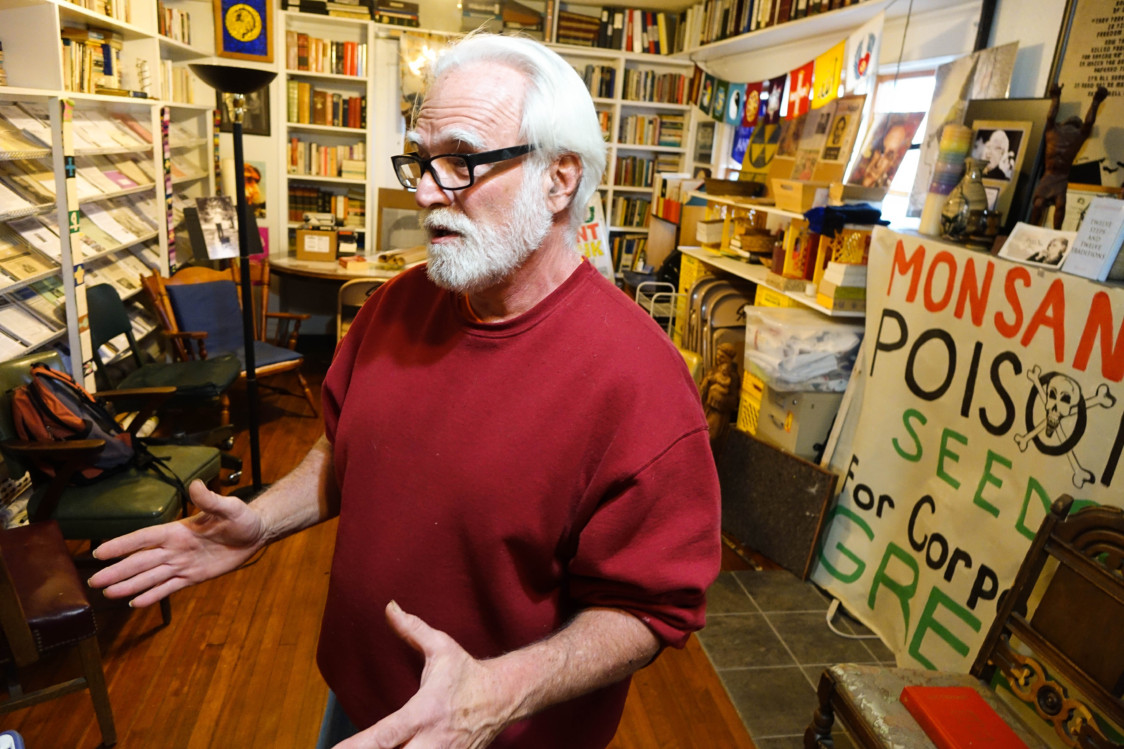
Frank Cordaro in his home at the Catholic Worker in Des Moines,
IA. An Alcoholics Anonymous meeting is hosted there at 5 pm on Fridays.
Finding Jesus
In Matthew 5:39, Jesus
tells his followers, “You have heard that it was said, ‘Eye for eye, and tooth
for tooth.’ But I tell you not to resist an evil person. If someone slaps you
on your right cheek, turn to him the other also.”
It’s the Bible verse where
we get that saying “turn the other cheek.” Most of the time, we say it to
someone who’s been wronged, to encourage them to react to the injury with
forgiveness instead of violence.
Turns out, there’s another
interpretation. Scholars have pointed out that, during Jesus’ time, slapping a
person across the face with the back of the hand was a statement of power. A
member of the upper-class might backhand a lower-class person, or a master
might do the same to a servant or slave.
A punch or open-handed
slap was a whole different story. This kind of strike was seen as a statement
of equality. So if slaves “turned the other cheek” after a backhand strike,
they were demanding their attacker treat them like an equal.
That’s the Jesus whom
Frank discovered while reading the New Testament in college. He attended the
University of Northern Iowa on a football scholarship, and admits that he
didn’t spend much time on his studies. “I didn’t have real respect for
the academics,” he said. “When I left college, I didn’t know how to find a
reference book at the library.”
But it’s clear Frank’s
done some studying since. “I found this new way to read the Bible,” he said. “I
read it as first-century literature. I need to know where, when, why these
things happen. Then I can construct what the author is trying to tell me.
That’s what allows me to make these sweeping statements.”
For Frank, the historical
context makes the message clear. “If you want to walk like Jesus, you gotta act
like Jesus. If you want to act like Jesus, you go to the book and see what he
did,” he said.
Jesus healed the sick and
restored the blind. He told his followers to shed their wealth. And, in Frank’s
interpretation, he pissed the Romans off so much that they had him executed.
That’s where Frank sees the radical Jesus who’s inspired him through his life.
“I’m telling you, he’d be against war in this country,” Frank said. “If you
can’t read that book, any of those Gospels, and come up with that understanding
of who Jesus was, you just can’t read.”
With a new understanding
of the Bible came a new understanding of Bishop Dingman, the man Frank used to
make fun of in high school. These days, Frank raves about the bishop: “I’m
telling you, the guy was extraordinary. Progressive, pro-woman, pro-peace,
pro-Jesus.”
Bishop Dingman became
Frank’s mentor, and inspired him to speak out against the United States’ role
in the nuclear arms race. He was also the one to ordain him as a Catholic
priest.
Before entering the
priesthood, though, Frank had to take care of a few things. He started the Des
Moines chapter of the Catholic Worker. He kept studying the New Testament,
which he said is easy to read, but hard to live. It also appears to have put
him into some unusual situations. Like poised in front of the Pentagon with a
bucket of blood in his hands.
Civil Disobedience
It was 1977 when Frank saw
the painting in the Pentagon. It was hung in a small room being used as a
chapel. In the painting, a young man in a soldier’s uniform was sitting in the
pews. Above the soldier’s head was a quote from Isaiah 6:8. “Then I heard the
voice of the Lord saying, ‘Whom shall I send? And who will go for us?’ And I
said, ‘Here am I. Send me!’”
Steve Jacobs, a Catholic
worker from Columbia, Missouri who was with Frank that day, remembers Frank’s
reaction well. “He was just livid. He kept saying, ‘That is so blasphemous.’”
Jacobs found the painting
blasphemous, too. “It’s a quote from the Old Testament about a young man who
worked in the temple, who acquiesced to be the Lord’s follower,” he said. “They
changed the meaning. They seemed to be using the Scriptures, taking them out of
context to justify the war (in Vietnam).”
Frank almost abandoned the
plan that had been developing all week. “He wanted to go and throw blood at the
painting, because it was so manipulative that they would use the Scriptures in
that way,” Jacobs said. “We had to redirect Frank’s attention toward the bigger
picture.”
The bigger picture, Jacobs
said, was essentially a piece of political street theatre. The performance
planning was done at a faith and resistance retreat held at Jonah House, a
faith-based community in Baltimore, Maryland. A dozen activists stuck needles
into their arms, draining their blood into bags and storing it for the show.
Five giant signs were made, each with one letter: D-E-A-T-H.
“The Pentagon is the place
where military violence is planned,” Jacobs said. “So we were laying that blood
down on the steps and pillars of the Pentagon so the people who were planning
it could see the results of their work.”
After taking the tour of
the Pentagon, the activists grabbed their supplies and approached the
Pentagon’s steps. It was August 9, the anniversary of the U.S. nuclear bombing
of Nagasaki, Japan.
Just as Frank reached the
steps, a familiar figure exited the Pentagon: one of his high school football
coaches, wearing an Air Force officer’s uniform.
The coach would have seen
a very different boy from the one he directed on the football field. “Do you
really know what you’re doing?” he asked.
“Yeah,” Frank said. “I
really do.”
His former coach nodded,
climbed into a waiting car, and was gone. The curtains went up. Frank reached
into his pocket for his packet of blood. He screamed, “The Pentagon is the
temple of death!” and threw the blood at the building.
Frank said being arrested
for the first time under the Pentagon’s pillars was one of the most authentic
experiences of his life. “That’s where real liturgy takes place, in the public
domain. At personal risk,” he said.
During his first trial, he
admitted to the charges, saying life is valuable and must be protected. He
would use a similar argument each time an act of civil disobedience landed him
in front of a judge. All of them put him behind bars for sentences ranging from
30 days to six months.
Somewhere between his
activism and subsequent prison stays, Frank found time to attend St. John’s
Seminary in Collegeville, Minnesota. He was ordained in 1985.
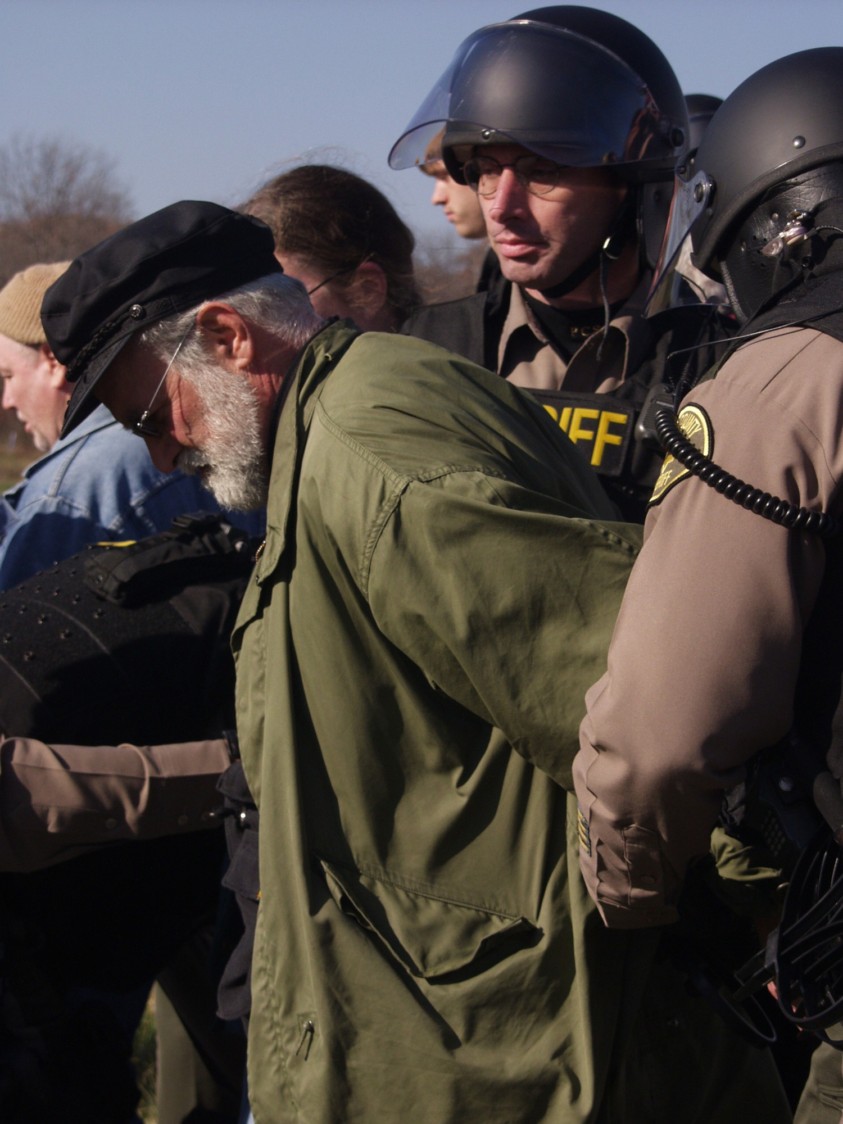
Frank Cordaro arrested while protesting at Camp Dodge in
Johnston, IA. Photo courtesy of Des Moines Catholic Worker.
Holy Contraband
Frank woke up early in
Sarpy County Jail for his morning routine. It was 1990. He climbed out of his
bunk and checked for guards, then grabbed the small toilet paper-wrapped
package he’d hidden. He stuffed it in the top of his sock, just in case. He
didn’t want to risk punishment.
He knelt for his morning
prayers. Frank prayed for the parish he’d left behind. He prayed for the broken
people in prison with him. He prayed for the soul of America. He said “Amen.”
With a furtive glance, he
pulled the package from his sock. Of all the habits he’d developed in prison,
this one soothed his soul the most. He peeled back the toilet paper to reveal a
delicate wafer. He partook in the Eucharist each morning on days when the jail
had no official mass.
Frank doesn’t tell me this
story. When I ask about his time in prison, he gives me a sentence or two
before changing course to conversations about the military-industrial complex
or his theory about the God of Empire and the God of Creation.
No, the holy contraband
story comes from a letter written to his parish on June 17, 1990. He sends me
more than 60 documents via email, each a series of letters written between 1988
and 2014. Volunteers typed them up and printed them in his church’s bulletin,
so his parish could keep tabs on their jailbird priest.
Frank sees jail as a
chance to lead a more disciplined life. He writes, prays and reads more
consistently, spends more time studying the bible. “In jail, I can be selfish
and take care of my own personal, spiritual needs,” he said. “On the other
hand, it’s in the middle of an environment that’s absolute chaos all the time.”
His letters reflect that
chaos, and some sadness, too. Sadness for the broken people the prison system
takes in and spits out. “Almost all the men here were victims first of
broken homes and dysfunctional families before they started breaking laws,” he
wrote in 1990. “The relationship between dysfunctional families, drug and
alcohol abuse and poverty and the people who occupy this jail is almost
absolute.”
Those broken people sought
Frank out when they learned of his priesthood. “They were really ready to talk
to anybody who represented somebody with a listening ear and a connection with
faith,” he said. “Jail was an honorable place to be for a Catholic priest.”
Jail was an honorable
place to be for a Catholic priest.”
– Frank Cordaro
Not everybody agreed with
him, including his own family. “It was hard for me to understand what he was
doing and why he was doing it,” Joe said. “Our mother was not convinced really
quickly, either. She was just angry with him for a really long time.”
Criticism
was harsh. The Catholic Mirror, the newspaper of the Diocese
of Des Moines, printed a letter to the editor in 1992. “How does he find time
to organize these protests when he has a full-time job?” the writer asked.
“What do we tell our children and grandchildren, or how do we explain to them
that this person knows what he does is illegal and against the law, yet
continues to do it anyway?”
Bishop Pates puts it a bit
more delicately. “Everybody has their own methodology. He certainly has
protested strongly for the poor, against nuclear weapons,” Pates said. “You
know, he’s arrested, and he spends a lot of time in jail. I think it’s a
lifestyle that he’s chosen. He feels it’s effective. But there are other ways
of protesting.”
Frank said his
parishioners wished he would have found other ways of protesting, too. “They
didn’t want to see me go to jail,” Franks said. “But on the other hand, I’d
say, ‘OK. Let’s get someone else in this Diocese.’ And they would say, ‘no,
stay.’ So I might have been crazy and quirky, but they liked me..”
Frank calls his time
working under Bishop Dingman a “Camelot moment” for the Catholic Church. The
two of them planned protests together, like trespassing at the Offutt Air Force
Base in Sarpy County, Nebraska. Frank said the bishop even planned to cross the
line himself, an act that might have gotten him arrested.
But Dingman suffered a
stroke right before the action in 1986. He passed away in 1992 without getting
a chance to participate in a protest. Frank, determined to carry out his
mentor’s legacy, wrote the bishops in the area: “The deal between Dingman and I
was that we’d develop a model of priestly life that involved civil disobedience
and resistance. I’m trusting we can carry on in that way.”
And they did, at least for
a bit. But Frank started stirring up other issues, too. “I was very publicly
advocating for women’s ordination,” he said. “I went to demonstrations down at
the cathedral, wearing my collar and everything. I was clearly pushing
boundaries.”
The Church pushed back.
They didn’t want him to protest anymore, at least not in ways that landed him
in jail. So Frank walked away.
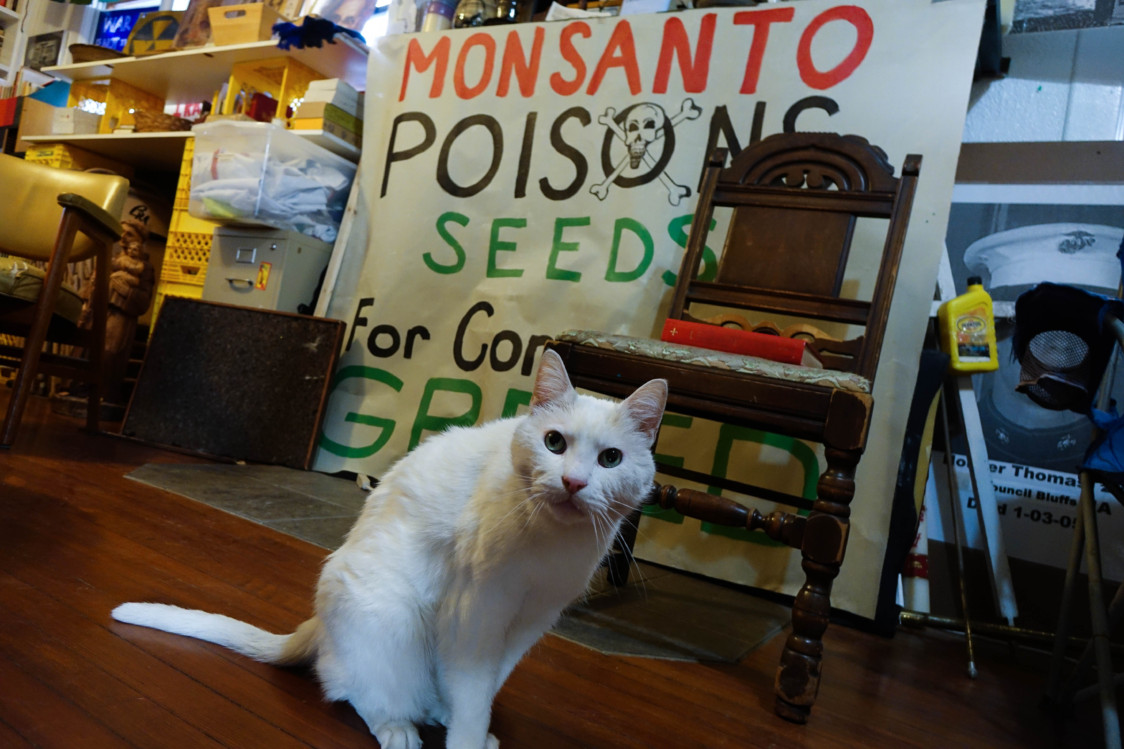
Phil, named for the peace activist Philip Berrigan, hangs
out in Frank’s house.
Blood, Hammers and the
B-52
Each year, the Andrews Air
Force Base hosts an open house. Thousands visit the Maryland base to see the
latest in aircraft technology. Pilots perform aerial stunts. Soldiers give
talks. And in 1998, five activists, known as the Gods of Metal Plowshares Five,
attacked a military bomber.
An interpretation of Roman
Catholicism allows for the destruction of property in the name of pacifism.
That’s where the Plowshares movement came from. The movement aligned with
Frank’s goals perfectly. When the first Plowshares action took place in 1980 —
a group of eight damaged a nuclear warhead and poured blood onto documents and
files — Frank knew he’d one day participate. Most Plowshares protests involved
active resistance to war. In this case, active resistance isn’t just writing
letters and making a few calls. It means trespassing on military property. It
means pouring blood. It means breaking things.
Frank wanted to break
things. He’d lost Bishop Dingman. His relationship with the church was tenuous.
His mother had just been diagnosed with Alzheimer’s. “I was just kind of
overwhelmed, emotionally,” he said.
He attacked a
nuclear-capable B-52 bomber with another priest, two nuns and a grandmother.
They struck the metal body with hammers and poured their own blood on its
surface. Somehow, even after punching holes in the bomber, they had enough time
to hand out explanatory pamphlets to the onlookers. Then, they were arrested.
Frank wore his clergy’s collar the entire time.
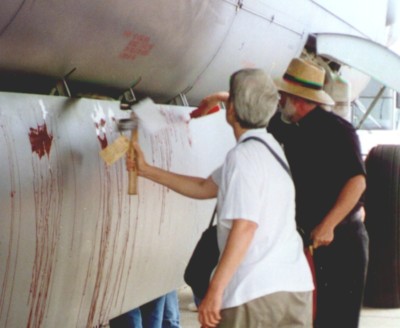
Frank and a fellow protester attack a B-52 bomber at the
Andrews Air Force Base in Maryland. He received a six month sentence for the
action. Photo courtesy of Des Moines Catholic Worker.
“I went through all the
emotions,” he said. “I like acting out things like that. I enjoyed it. It was
exhilarating. It was truth-speaking. It was ground-leveling, spiritual stuff.”
The resulting six months
in jail were not so enjoyable. But Frank said prison was bearable because he’s
proud of what he did to get there. His time in prison is a reflection of his
conscience.
After six months in
prison, Frank returned to the priesthood one last time. A heart attack — a
revelation, of sorts — in 2001 convinced him it was time to leave the order for
good. This final departure was different than simply walking away in
frustration, though. He met the bishop face-to-face. ““Bishop, this has nothing
to do with you, and everything to do with me,” Frank said.
When I ask him why he
left, he’s blunt about the personal nature of the decision. “I couldn’t deal
with the whole celibacy thing,” he said. “I just got tired of the lack of
integrity from myself. I live one life in public, and another in my private
life.”
Today, Frank lives full
time at the Catholic Worker. The main house is named for Bishop Dingman. He has
two cats, Philip and Daniel Berrigan, both named for radical Christian
anarchists, and a girlfriend he says is “half my age, twice my spirit.”
Now, nearly his entire
family supports his protesting. Joe said he got on board when Frank explained
that everything he did was rooted in the Bible. “Jesus was crucified for what
he believed. And Frank thinks we should do the same,” Joe said. “That message
hits people really hard because they’ve always believed the Gospel, but they’ve
never met anybody who really, actually lives it. It’s unbelievable how, every
time Frank goes to jail, these discussions come out of it.”
Before her death, even
Angela Cordaro came around to civil disobedience. “Yeah, she was a co-defendant
at one point,” Frank said. “I told the judge, ‘Hey, you can’t blame me, my
mother told me to do it.’”
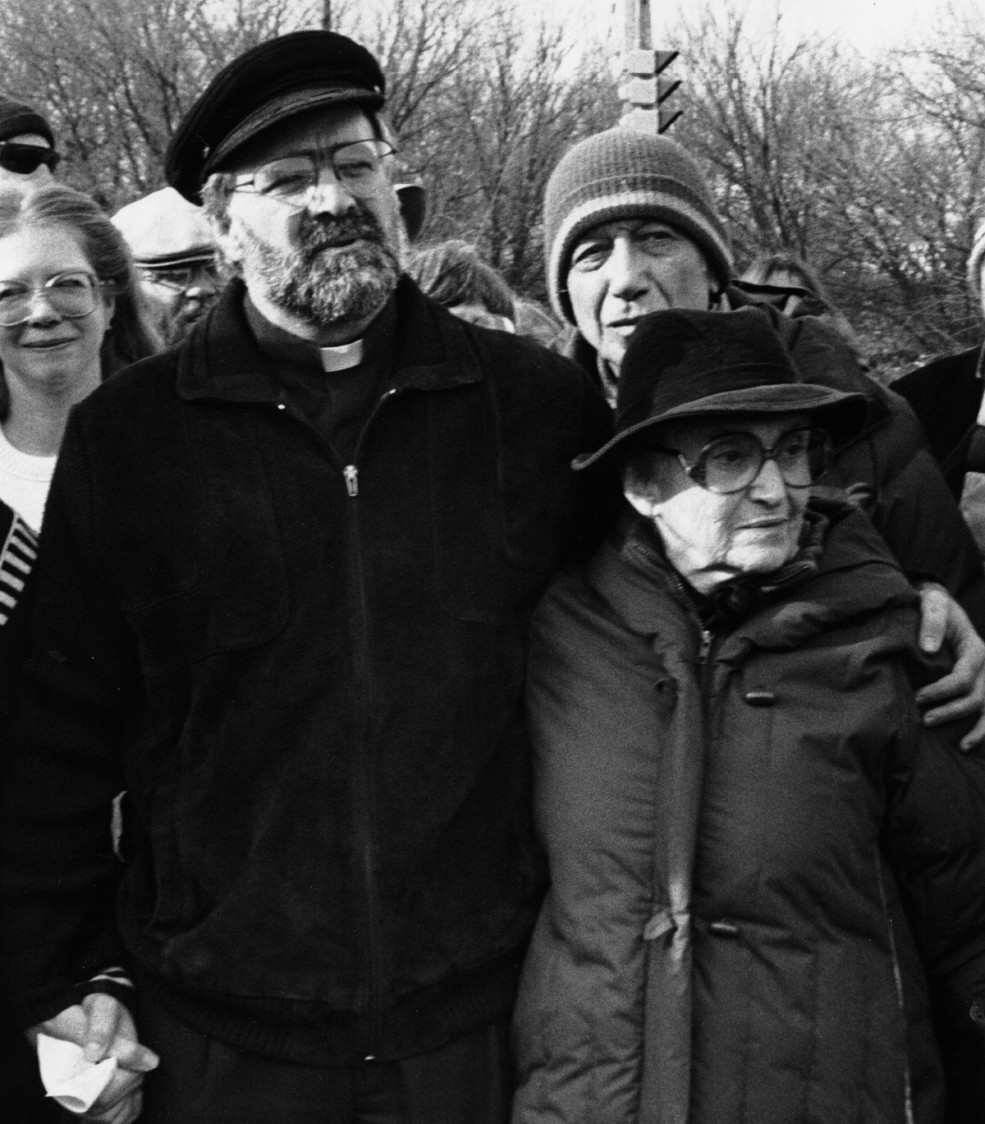
Frank and his mother, Angela Cordaro, protesting at the
Offutt Air Force Base in 1989. Frank would later be arrested while still
wearing his clergyman’s collar. Photo courtesy of Des Moines Catholic Worker.
A Fragile Nobility
Frank’s been trying to fit
exercise into his schedule since his heart attack. I tag along for a walk that
doubles as a tour of his neighborhood. His old high school is twenty minutes
from the Catholic Worker houses, and he points out the field where he used to
play football. At times, he gets so involved with his storytelling that his
stride slows to a shuffle, then a stop. After a few minutes of standing in the
middle of the sidewalk, he makes his point, looks around as if just coming to,
and continues marching.
We pass by a group sitting
near the Bishop Dingman House. One woman is holding her arm and crying. Frank
approaches her and they talk for a few moments, voices low. Frank tells her to
take care of herself, and we walk again. I ask if she’s OK.
“No, she’s not OK,” he
said. “This is crazy. She can’t live on the streets like this. She’s a very
strong woman, but she’s just — she needs to get off the street, or die. She’s
been on the street too long.”
I’m not sure what to say.
I observe that coming to the Catholic Worker and having steady meals must be
good for her. “Yeah, when we don’t have to kick her out,” he says.
Frank protects the woman’s
privacy, so I don’t get much more of her story. He does tell me that guests
aren’t supposed to come to the house drunk. Frank usually lets that rule go.
“Everybody comes in drunk,” he said. However, anyone getting too rowdy or
violent has to leave. Kicking out the people who, in his eyes, need the most
help is the worst part of Frank’s job. But he takes the bad with the good.
“That’s just the way it is. It’s still good. It’s just that good isn’t pretty
all the time. Pretty much any good that’s worth a damn is never pretty.”
Frank Cordaro is trying to
do heroic and noble work. He’s not always a heroic and noble person. And maybe
that’s OK.
--
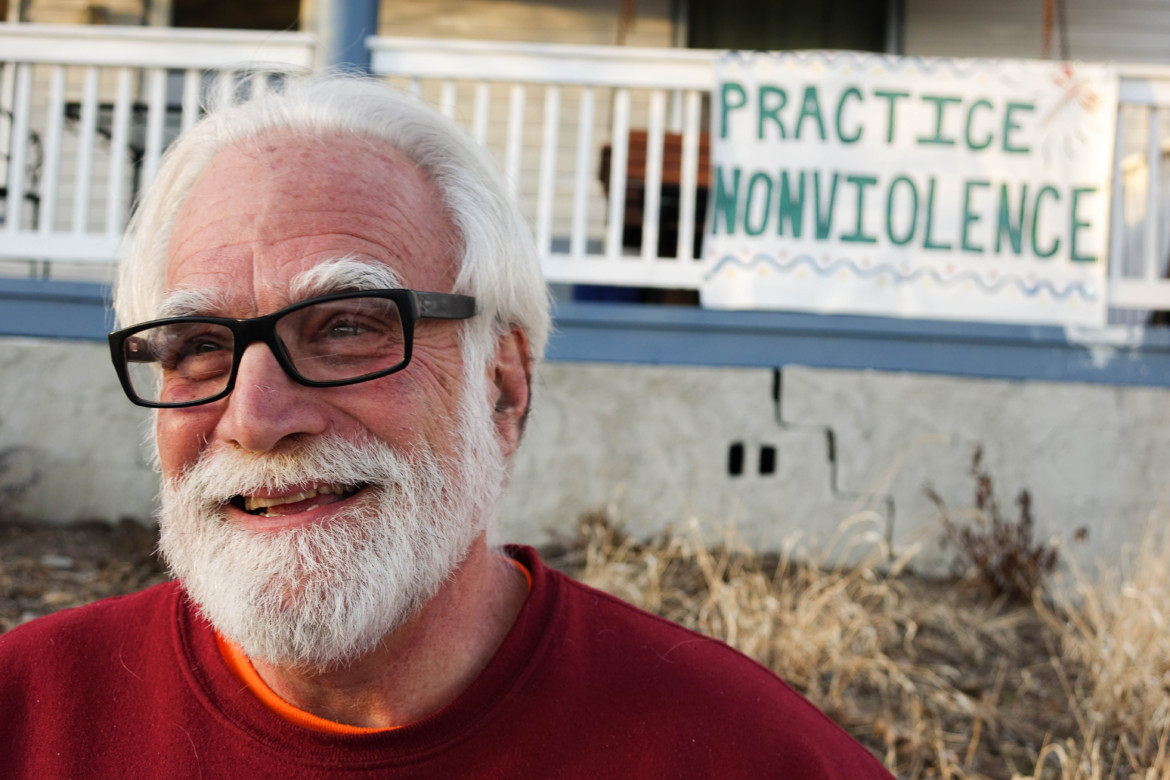
No comments:
Post a Comment